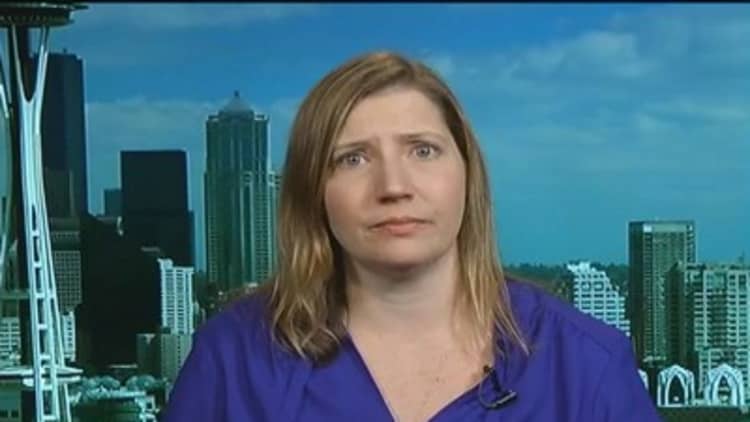
The partial government shutdown may have ended a couple of weeks ago, but, like a bad hangover, the economic fears and financial uncertainty it created are lingering.
It's showing up in the latest Gallup poll on economic confidence, the weak consumer confidence numbers that came out last week—and in Cindy Sweisthal's holiday budget.
"I'm definitely thinking like I want to have at least a month's salary in the bank. Is that going to affect Christmas? Absolutely," Sweisthal said.
The 45-year-old executive administrative assistant is pinching pennies after her husband, an air traffic controller, wasn't paid for several weeks even though he had to report to work.
(Read only: How the weak jobs recovery slammed men and women)
His paychecks are flowing again, but Sweisthal, who lives in Middletown, Del., said the behavior she's seen in Washington since has her worried about how long that will last.
"I have no confidence that this won't happen again," she said.
Economists say the damage the partial shutdown and debt ceiling fight created can heal, but it could take some time to rebuild Americans' confidence. That's especially problematic because the Great Recession was such a deep blow, and the subsequent economic recovery has been so weak and fragile.
"What's going on in Washington is like this heavy weight on the collective psyche," said Mark Zandi, chief economist with Moody's Analytics. "Sometimes it's heavier than others, but in general since the recession hit it's served to dampen confidence."
Zandi thinks the key ingredient to stronger economic growth is confidence, whether that's a business having the guts to hire a bunch of new employees or an individual feeling good about making a big purchase.
"We just haven't gotten our groove back yet," Zandi said. "We're not confident enough to really step out and take those risks."
The Conference Board reported last week that consumer confidence deteriorated considerably in October as Americans were shaken by the government shutdown and debt ceiling fight.
In a research note, economists with IHS Global Insight said flatly, "This is a very bad report."
(Read only: From low to no wage: Shutdown hammers working poor)
Consumer confidence is likely to rebound now that the government is up and running, but the IHS economists warned that such things usually fall faster than they rise.
That's especially worrisome to retailers who are heading into the all-important holiday season hoping to convince shoppers to open their wallets, and may not have time to wait for people to grow more optimistic.
Separately, a Gallup poll released last week found that Americans' economic confidence has risen since the shutdown ended, but is still well below the level it was in mid-September, before the shutdown.
It's already clear that the effects of the shutdown go beyond just fear and uncertainty—by some estimates it shaved billions from the nation's gross domestic product, hampering growth.
An all-too-familiar fight
Experts say one big factor is that this kind of brinkmanship has become all-too familiar, most notably with the earlier debt-ceiling squabbles and the fiscal cliff negotiations.
Sheila Tschinkel, a visiting scholar at Emory University and former senior vice president at the Federal Reserve Bank of Atlanta, said the fact that those former fights didn't end in economic catastrophe appeared to be one reason the stock market didn't plummet during the most recent fight.
"There's only a number of times you can cry wolf," she said.
But that déjà vu element could be having a more negative effect in which people—subconsciously or not—put off a big business investment or hesitate before making a big purchase because they don't know what Washington will do next, Tschinkel said.
"It's described all the time as a headwind, and I think it has been a headwind," Tschinkel said.
It's not clear how much politicians are doing at this point to ease those fears.
Sweisthal, who is also a Navy veteran, said she's frustrated that since the shutdown, politicians appear to be more focused on criticizing Obamacare than on coming to an agreement about the budget.
In general, she said, she'd like to see them show that they care more about helping average Americans, or at least show some remorse for the shutdown.
(Read only: 'Treading water': Saving for retirement is harder)
"Make an apology, do something—and give people the confidence that this is not going to happen again, rather than just pointing fingers on who didn't get the website to work," she said.
Plenty of Americans appear to be equally disillusioned. The latest NBC/WSJ poll released last week found that the popularity of every player—from President Barack Obama to the Republican Party—has eroded in the wake of the shutdown and the launch of the health-care exchanges.
That's one reason Zandi doubts there will be another shutdown soon.
"I think policymakers have learned that they did significant economic damage," the economist said.
Perhaps more importantly to them, he added, the fight also clearly caused significant political damage.
"I can't imagine them taking us down the same dark road that much closer to the next election," Zandi said. "I think that would be political suicide."
—By CNBC's Allison Linn. Follow her on Twitter @allisondlinn and Google or send her an email.


